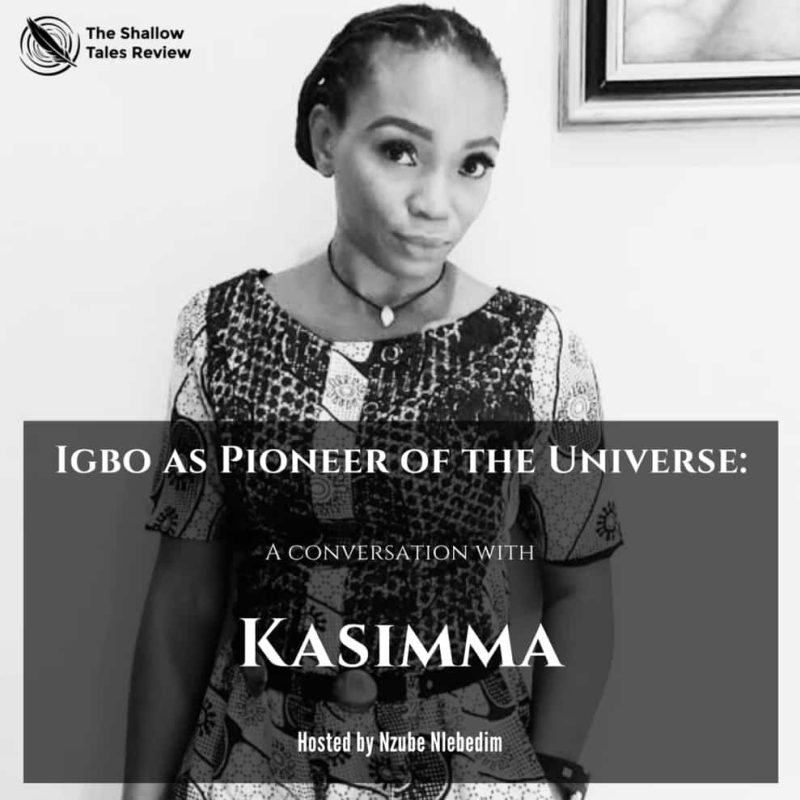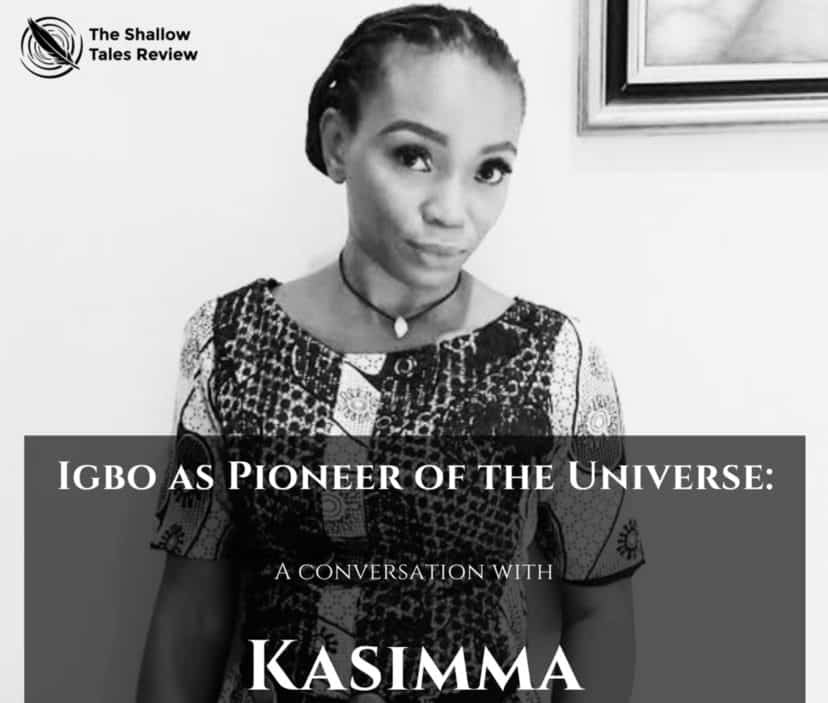
Kasimma is from Igboland. She is an alumnus of the Chimamanda Ngozi Adichie Creative Writing Workshop. Her works have appeared on Guernica, Meetcute Podcast, The Puritan, Cinnabar Moth anthology, Native Skin, Afreecan Read and elsewhere. She’s been a writer-in-residence across residencies in Africa, Asia, and Europe.
What sparked off writing for you? Have you always known you would be a writer?
First, Nzube, such a pretty name, thank you for having me on The Shallow Tales Review. So, yes, I have always known I will be a writer. I am one of those people who started reading and writing before they started making friends; who had story characters as friends before real, walking, living, human friends. I guess the folktales my father, his sisters, his mother, told me are responsible for my being a writer. Those stories were told to me in Igbo, and I still remember every last one of them as well as their respective songs. Come to think of it, maybe that’s why I’m all about Igbo stories.
Chika Unigwe described your collection of short stories as one that, “…pulses with wit and wisdom. In stories that often surprise, that often blur the line between the living and the dead, Kasimma presents a Nigeria that is peopled with characters struggling as much to understand as to be understood.” What was your motivation for writing this book?
My children. They are my motivation for even staying alive.
Your work borders, amongst other things, on Igbo cosmology, spirituality, and mysticism. What fascination do these hold for you as a writer, especially in respect to the belief that many now have of our local traditional practices as diabolic?
There is nothing diabolic about Igbo cosmology. Igbo amaka! This idea that our tradition is diabolic is a direct result of colonialism. Igbos are the pioneers of this universe. We are the first colonisers. Anyway, let me quietly answer your question. Igbo is mine. It is the language of my ancestors. It is the language of my children. It is the language of my former life. I don’t want it to die. I don’t want her traditions to fade. We are too damn colonised. I want to reincarnate an Igbo woman. This is my quota at making sure that Igbo is even here for me to reincarnate into.

You identify on Twitter as a “placard-carrying feminist.” In a world that seems to favour men to women, and that gives men higher regard than their female counterparts, many female writers in Nigeria have, in recent years — if I may use the term — humanised femininity in their works. Where does feminism feature most prominently in your writings, and especially, of course, in All Shades of Iberibe?
Nzube, nwannem, I am a hardcore, placard-carrying feminist. You missed the word “hardcore.” I don’t know which story I’ve written that doesn’t scent of feminism.
What did Why Aren’t We All Feminists? attempt to resolve?
Most times, I don’t know how a story will end until it does. When I sit to write, I am not thinking of crafting my story to resolve anything. Resolve is Ikenga. And on this issue of sexism, it will take more than my voice to achieve ikenga. I try, instead, when I write to make sense of a situation and to lend sense to a solution. In my writing, I generously lend an iota of my sense to misogynists.
Going by Ernest Emenyonu’s revamped definition of the Igbo novel as “novels that organically grew out of Igbo oral tradition, depicting wholly and entirely Igbo worldview narrated in the skilled manner of Igbo orators—lacing speeches, dialogues, or arguments with Igbo idioms, proverbs, wit, and wisdom which entertained as they instructed,” would you consider All Shades of Iberibe an “Igbo story”? Do you agree with Emenyonu’s label?
I do agree with Prof. Emenyonu. Proverb is the salt used in eating Igbo words. Everything he has said is embodied in All Shades of Iberibe.
You mentioned in an interview, and I quote, “Igbo culture was dampened by the Brits and further slashed by the swords of the Biafran war. A lot of Igbos bear English names just to fit in.” You also mentioned here that “names are stories on their own.” I related well to your stand because, in 2020, I had grown weary of my English name and thereafter dropped it all together to take up full-time my Igbo name. Would I be right to assume that the name “Kasimma” is a form of protest against the neglect of our traditions?
The decision to answer my Igbo name is a statement that, that’s right, Igbo amaka! Igbo kasi mba niile mma.
In that same interview, you expressed your fear, pre-publication, of your work being gleaned of its “Igbotic” essence. I have heard other writers decry this seeming fate of African writers publishing in the West; their inability to understand why editors and publishers do not allow them to write freely in the tongue they want to. Nativising the English language to suit our own linguistic and pragmatic views is a predominant problem when publishing away from home where our cultures are not known nor understood. What do you propose is the way to stem this problem?
Write what comes to you, in a voice that comes to you. Everybody will tag along eventually.
What is your opinion on the trajectory African literature is going on today?
African literature is brimming with health. African literature is on track.
Like you, contemporary writers such as Chigozie Obioma, Okey Ndibe, Akwaeke Emezi, and Chimamanda Ngozi Adichie, are exploring and promoting the seemingly ignored traditional worldview of the Igbo people. Do you predict Nigerian literature becoming more indigenous, less English?
No. I don’t think we will get more indigenous and less English texts in the near future. We do not even properly learn how to read and write our languages in Nigerian schools. We are still not allowed to speak “vernacular” in school. Do we even read indigenous books in schools? Besides, English is the official language in Nigeria. It is the language of instructions in our schools.
Writers are training their compasses back home. Àtelẹwọ ́is doing a good job promoting Yorùbá literature written in Yorùbá. The International Booker Prize is also doing well in promoting and rewarding translations. In an interview with Ukamaka Olisakwe, Kọ́lá Túbosún advocates for the reemergence of African literature written in indigenous languages. Do you perhaps see a future where Igbo literature written in Igbo, and not English, would come to be the norm?
I pray for that future. I really worry for Igbo. How many people can speak the language? How many people can read and write it? There is a need for a hardcore awakening so that this future you envisage will come to pass. I hope it does. But whether people can read Igbo or not, let those who can write in Igbo write.

Many African writers have taken sides on the issue of literary contests and prizes. While some say the up-and-coming writer should gun for the awards and honour, others who belong to the Gurnah school do not encourage such but prefer to write for the sake of art itself. What is your view on this?
Is there any writer who is worth their salt that is writing for just prizes? Yet, I have not seen any writer who doesn’t want to win a prize. Remove the last letter from “writer,” and you have the meat. Awards are important, very important, because they make books even more noticeable and boost readership. Every writer wants to be read. That is paramount. But what is “writing for the sake of art itself”? If writing is not the art itself, then I don’t know what is.
I first encountered the title and cover of All Shades of Iberibe on Brittle paper when it was spotlighted as one of the top 20 novel covers in 2021. My first thought on seeing the cover was Amos Tutuola’s The Palm Wine Drinkard. Following sheer instincts, I associated your work with deep Igbo culture. Could you explain the cover of your book?
A lot of people have compared the cover of my book to Tutuola’s or Achebe’s. Karo Akpokiere is the cover artist. He explained the creation process of All Shades of Iberibe cover page in an interview on Brittle Paper.
What is the main focus of your writing? What thematic gap in Nigerian literature do you see yourself filling in a couple of years?
When I sit to write, I am not thinking of a thematic gap, or any gap at all. I am not even thinking of the focus of my writing. Sitting to write is willing my body to my characters to possess and tell their stories. When they finish and vacate my body, I go back in and clean up sentences.
Do you have a favourite story in this collection?
I love them all. They’re all my babies.
How long did it take to write this book? Was it an afterthought?
It was not an afterthought. Every story in this collection is deliberate. It took about a year to write it.
What is that one admonition you would wish you had been told when you started writing?
Somebody should have told me that writing is like being possessed. You cannot eat, cannot sleep, cannot even use your God-given brain until you write down that story tugging at your heartstrings. But the joy, peace, lightness, that comes after a good writing spree is pure bliss (not the wafers o!)
What book are you reading at the moment?
A Bound Woman is a Dangerous Thing by DaMaris B. Hill.

